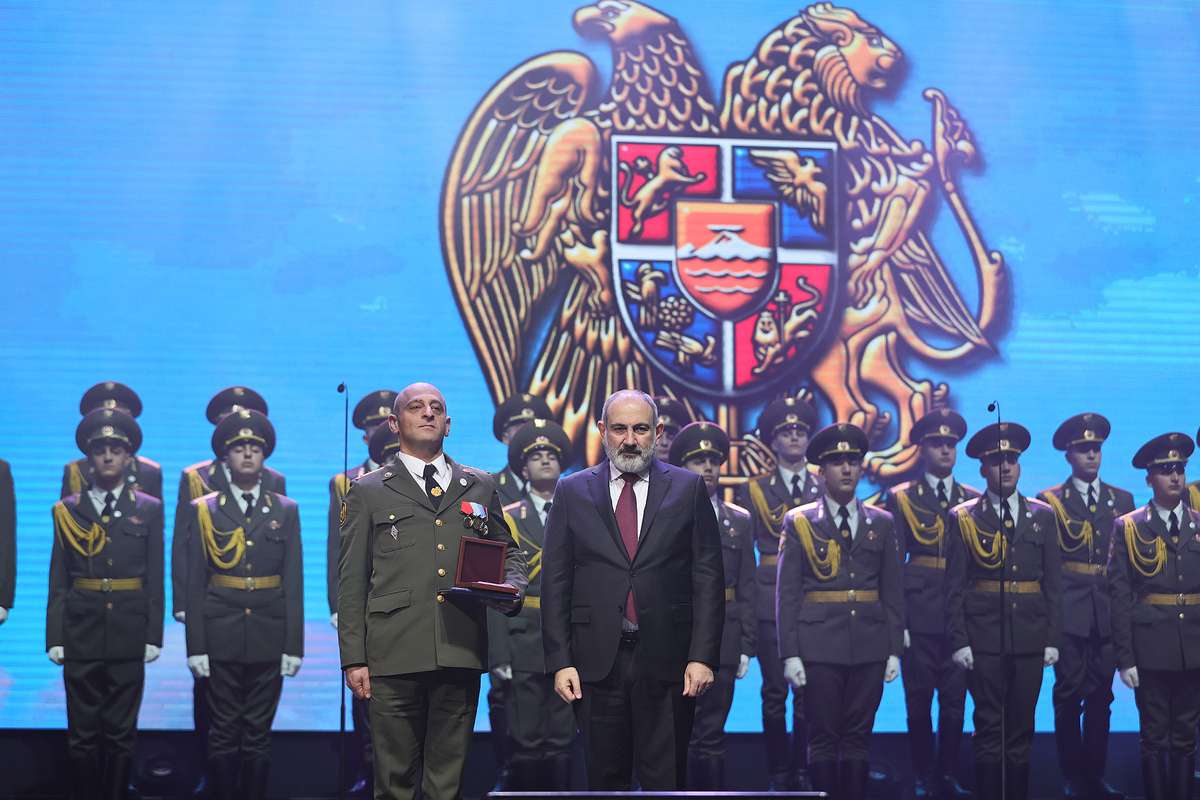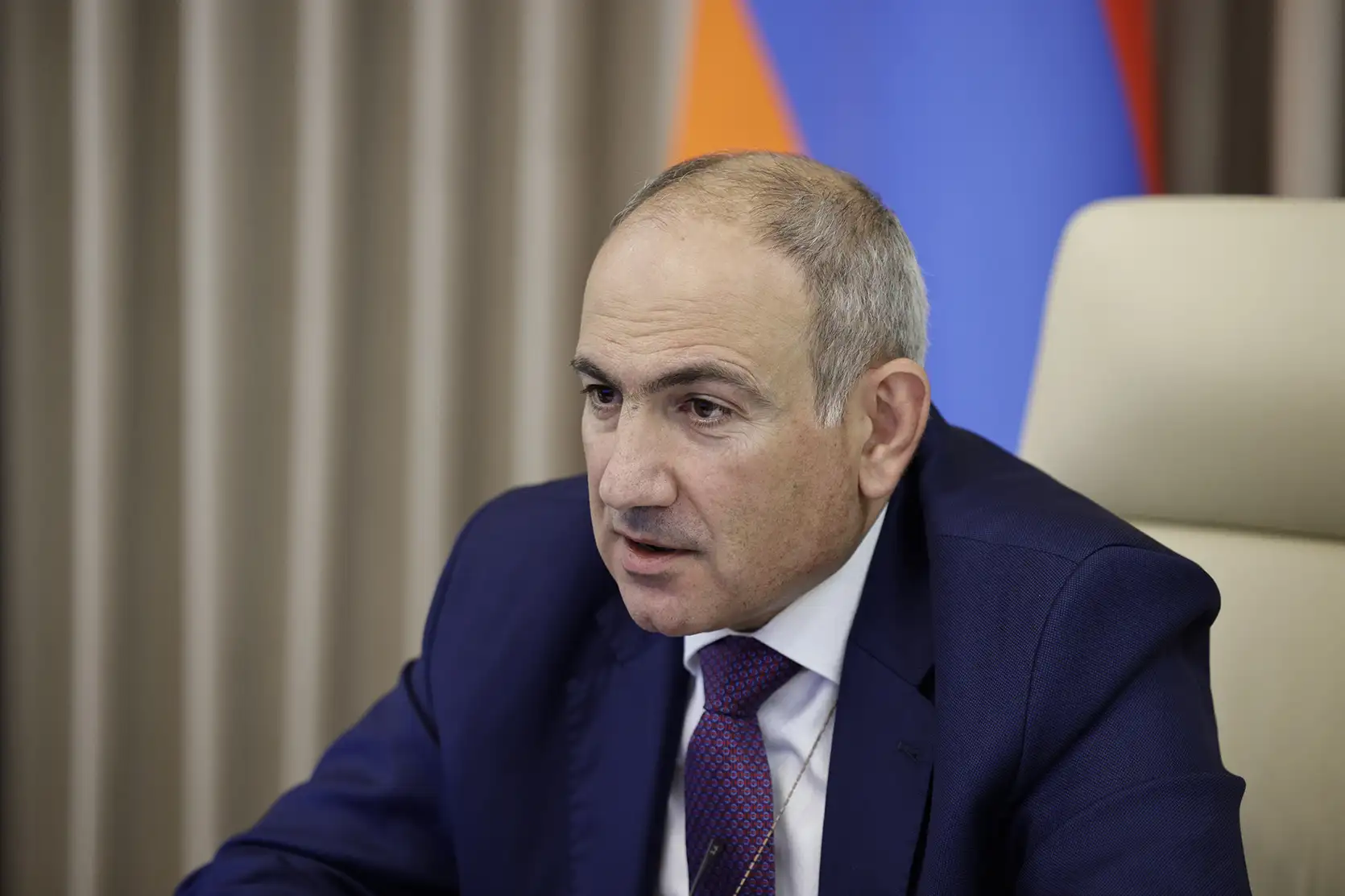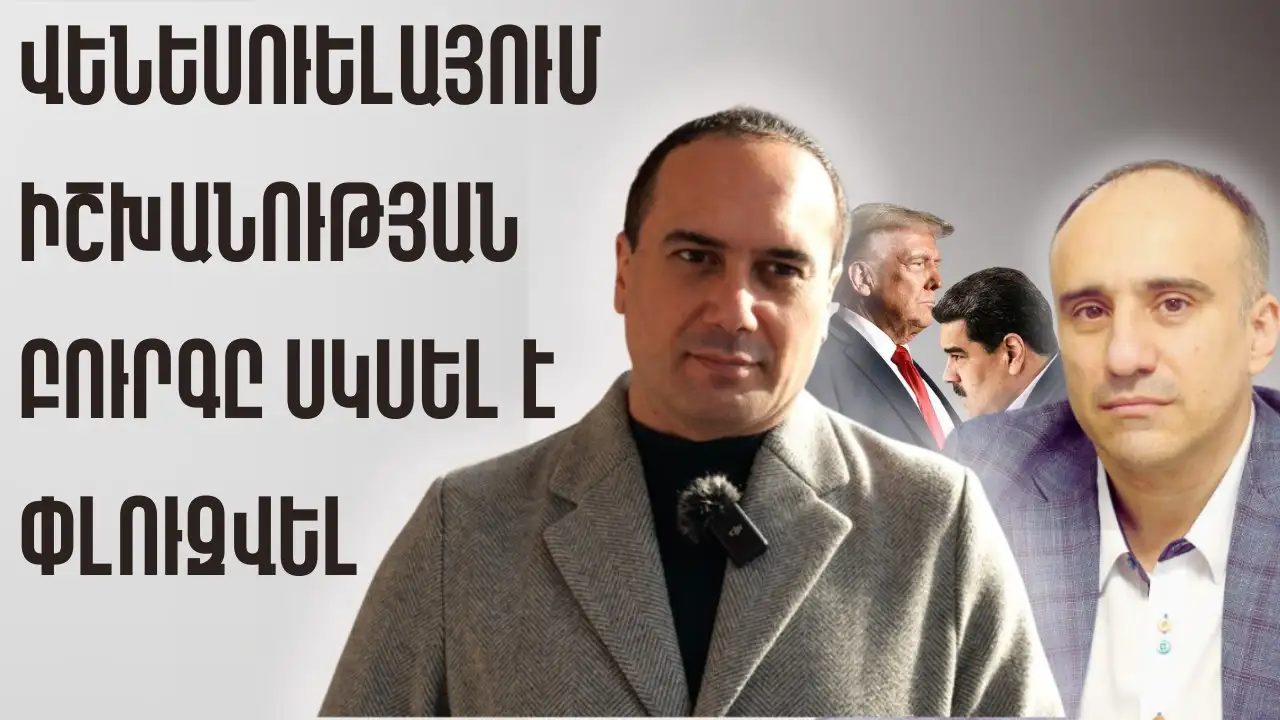Prime Minister Nikol Pashinyan attended the festive event dedicated to the 32nd anniversary of the formation of the Army of the Republic of Armenia at the Karen Demirchyan sports concert complex in Yerevan. The President of the Republic, Vahagn Khachaturyan; the President of the National Assembly, Alen Simonyan; representatives of the legislature, executive, and judiciary; the highest officers of the Republic of Armenia; and ambassadors accredited to the Republic of Armenia were also present at the latter.
At the beginning of the event, the national anthem of the Republic of Armenia was played. Then, the attendees observed a minute of silence in memory of the Armenians who sacrificed their lives for the sake of the motherland. Prime Minister Nikol Pashinyan made a speech in which he specifically stated:
"Today, we celebrate the 32nd anniversary of the founding of our army, and on this day, we first of all kneel before our servicemen and volunteers who fell while being faithful to their oath to the Republic of Armenia.
The 32nd anniversary of the Army of the Republic of Armenia's formation should be recorded. It is a time to reflect more and face the problems we have in army building, security, and even failures.
That confrontation forces us to record that we cannot continue to have an army based on outdated standards and concepts of military affairs because this would mean questioning our will to have a state.
The first thing that should change in our army is the mindset. And that change should be expressed in every detail, starting with the uniform, continuing with the appearance of each soldier, continuing with the environment, weapons, and equipment at permanent deployment sites, the salary of service members and the system of social guarantees, our requirements for the professional skills of service members, and the degree of ideological preparation of each service member. We have started this process, but we are moving fast enough.
As in many parts of the state system, our ideas about speed must also change. The ideas about speed in the army should also be changed, and here we are talking not only about the speed of reforms but also about the speed of the army's actions. What we used to think of as speed is now hopelessly slow, from the speed of assessing the situation to the speed of decision-making, commanding, and executing orders.
Strategically, we are proceeding with the logic of having a professional army. In this sense, the "Defender of the Citizen" program is our most tremendous success in recent years, becoming the foundation and cornerstone of a professional army today. This is a system that allows conscripts to become at least 5-year contract soldiers, receive a monthly salary of 450,000, sometimes 500,000 AMD or more as a result of voluntary certification, serve their home in the nearest military unit, and live at home during the service as a professional, and at the end of the five-year term, receive 5 million drams in one lump sum, regardless of whether he wants to extend the term of the contract for another five years or not.
But also, against this background, it is necessary to emphasize that the army should stop being an object of cheap toasts. Because when you try to understand what is hidden in the depths of those toasts, you face the bitter reality that less than half of the draft-age group is drafted into the army.
This means that our generation has serious health problems, or the draft remains the most flourishing environment of corruption in the Republic of Armenia, where representatives of the medical community, the military, and the public are allied. If this is the case, and there is such a possibility, this is an alliance that destroys the state, and we must break the backbone of that alliance because that alliance calls into question the right of our state to exist. Here, of course, the question of the effectiveness of the law enforcement system is very acute; on the other hand, we must go the way of institutional reforms and decisive decisions so as not to leave the room or minimize the possibility of abuses.
We are introducing the women's voluntary compulsory military service model this year. Our women can make a significant, more outstanding contribution to the country's defense. It is symbolic that the first female soldier to be conscripted under the new system will be sworn in today.
I also want to remind you that women who are conscripted for voluntary compulsory military service will receive a one-time honorarium of 1 million drams at the end of the six-month service, and all women aged 17-27 can apply for the six-month service. We hope that a significant part of the women passing the six-month service will contract military service, where there will already be salary opportunities available for men through voluntary certification under the "Defender of the Country" program. Women must become one of the reliable pillars of our professional army. It should also be noted that more than a professional army is required to protect the country's security in war situations, and having a combat-ready reserve force is our next strategic task. The 25-day training camps and regular military service are fundamental in this sense. But today, we see many gaps in that system, and I expect these problems to be solved with decisive decisions. Those problems start with the level of recruitment and the quality and content of the 25-day training camps. Above all, we have severe cracks in soldier-soldier, soldier-officer, and officer-officer relations that we must fill. In general, all attempts and factors to turn the army into an open or semi-open regime penitentiary must be eradicated with consistent and decisive steps. This applies to both 25-day training camps and term and contract military service.
We pay special attention to military education and increasing the attractiveness of officer work. In this regard, I would like to highlight the projects of providing housing for graduates of the Military University, the military academy named after Vazgen Sargsyan, and the establishment of the Officer High School and the Officer University in the Academic City. Ensuring the intellectual depth of the Army of the Republic of Armenia is a critical component of increasing combat capability, and we must also pay special attention to it.
Dear attendees, we also need to review our strategic understanding of security.
It is necessary to admit loudly and directly that the ideas rooted in us about safety and security systems and their operational formulas played a disastrous game on our heads, and there is no other option for the Republic of Armenia than the diversification of security relations.
And we're going that way. We are on the path to acquiring new and modern weapons and equipment, and in recent years, the Government has signed contracts to purchase guns and ammunition worth several billion dollars.
The military-industrial complex of the Republic of Armenia has an unprecedented order of several hundred million dollars from the Armenian Government. Of course, we will continue to invest in the military-industrial complex, simultaneously increasing science and education funding.
For these achievements and the opportunity to invest, I want to thank again and again all the law-abiding taxpayers of the Republic of Armenia, who are practically implementing the slogan "get rich and get richer" proposed by us in 2018. And the tax revenues of the 2023 budget, already realized, were more than the revenues of the 2017 budget by about 2.5 billion dollars. And with these funds, army and armed forces reform is also being carried out.
Reforming the army and having a solid and combat-ready army is the sovereign right of every country, and we will continue to follow this path. A solid and capable military is one of the most important factors ensuring the sovereignty, territorial integrity, and independence of the Republic of Armenia, but it is not the only factor. From the point of view of ensuring security, I emphasize two more key factors: foreign relations and the legitimacy of the conducted policies from the point of view of international law.
Legitimacy should be the most critical factor in ensuring Armenia's external security. What do I mean? The Republic of Armenia should identify itself with the territory on which the international community recognizes it. It is the Armenian SSR's territory, identical to the sovereign territory of the Republic of Armenia. We must state clearly and unequivocally that we do not and will not have any ambitions for any other territory, and this should become the strategic basis for ensuring Armenia's external security.
I can't help but refer to several aggressive statements from different sides, particularly from Azerbaijan, related to the reforms of the Republic of Armenia's army and the acquisition of weapons and equipment. I have already said that having a solid and capable military is the sovereign right of every country, and no one can question our rights. If anyone questions that right of ours, they question our right to exist. In this case, we will have no choice but to defend our statehood, independence, and territorial integrity by all possible and impossible means.
I record again that the Republic of Armenia has no claim to any territory other than its sovereign territory, and no one should have any claim to any territory of the Republic of Armenia. As I said, we are ready to give such lasting and irreversible guarantees, but we expect similar guarantees from others.
We are ready to go that way and have proposed several security mechanisms in Azerbaijan. For example, a mirror withdrawal of troops to the administrative border of the Armenian SSR and the Azerbaijani SSR. That border became a state border with the 1991 Alma-Ata Declaration, and Armenia and Azerbaijan agreed on October 6, 2022, in Prague that they recognize each other's territorial integrity. The mirror withdrawal of troops will make it possible for all the territories of the Azerbaijan SSR to be under the control of Azerbaijan and all the regions of the Armenian SSR to be under the control of Armenia.
We have also offered demilitarization of the border with Azerbaijan. Also, a mutual arms control mechanism is signing a non-aggression pact if it turns out that signing a peace treaty will take longer than expected.
Summarizing my speech, I want to thank all the service members of the Army of the Republic of Armenia who are impeccable, professional, and loyal to their oath to the Republic of Armenia. Glory to the martyrs, and long live the Republic of Armenia. Long live the Republic of Armenia."
On the occasion of Army Day, Prime Minister Pashinyan awarded a group of servicemen of the RA Ministry of Defense with a commemorative medal of the RA Prime Minister for their contribution to the security and defense of the homeland. Defense Minister Suren Papikyan also made a speech during the event.




















